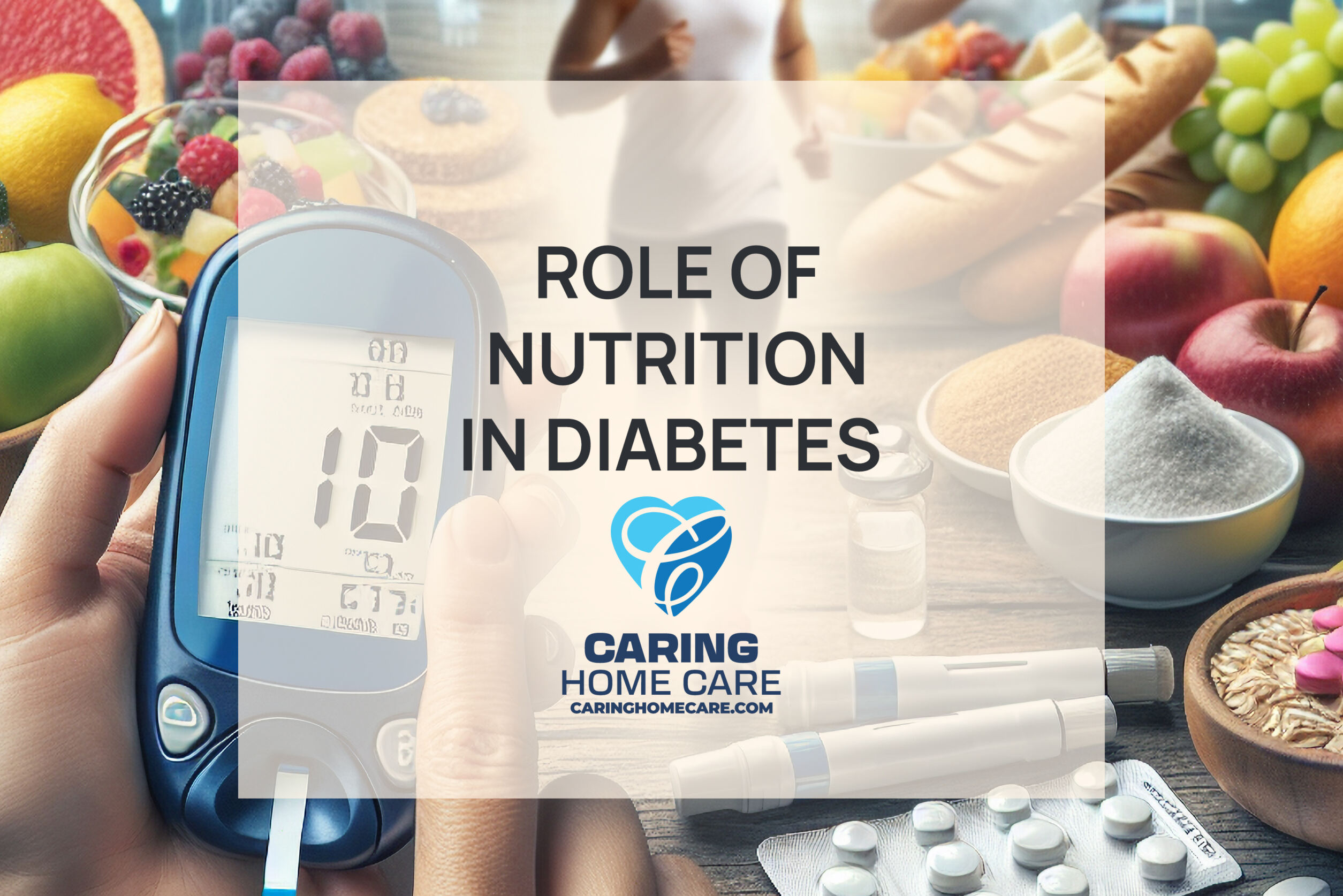Share

The Role of Nutrition in Diabetes
Supporting Better Health Through Smarter Food Choices
Managing diabetes becomes more important as we age. For seniors living with this condition, proper nutrition isn’t just a recommendation—it’s essential. The role of diet in diabetes care can’t be overstated. It helps regulate blood sugar, reduce complications, and improve quality of life.
At Caring Home Care, we know how challenging it can be to adjust meals, snacks, and routines. That’s why we focus on offering simple, effective diabetic nutrition tips to support better senior diabetes care at home.
Why Nutrition Matters for Senior Diabetes Management
As the body ages, it changes how food is processed. Seniors often face slower metabolism, decreased physical activity, and other health issues. All of these can affect how diabetes develops and is controlled.
That’s why senior diabetes management requires a personalized approach. A well-balanced diet helps:
- Control blood glucose levels
- Maintain a healthy weight
- Lower blood pressure
- Reduce the risk of heart disease
Good nutrition works hand in hand with medication and physical activity to keep diabetes in check.
Key Nutritional Goals for Seniors with Diabetes
Here are the major goals to consider when planning a diet for diabetic seniors:
- Stabilize Blood Sugar
Eating regular, balanced meals keeps blood sugar from spiking or crashing. Each meal should contain a mix of complex carbs, lean protein, and healthy fats.
- Reduce Sodium
Too much salt can lead to high blood pressure, which is already a concern for many seniors. Choosing low-sodium options helps support heart health.
- Increase Fiber
Fiber helps slow down the absorption of sugar, keeping blood sugar levels more stable. Whole grains, vegetables, beans, and fruits are excellent choices.
- Stay Hydrated
Dehydration can raise blood sugar levels. Encourage seniors to drink water throughout the day, especially during warm weather or when taking diuretics.
Diabetic Nutrition Tips for Everyday Meals
Meal planning can feel overwhelming at first, but small changes make a big impact. These diabetic nutrition tips are easy to follow and ideal for older adults.
- Choose Whole Grains
Swap white bread and rice for whole grain options like oats, brown rice, and quinoa. These provide fiber and energy without causing sugar spikes.
- Limit Sugary Snacks
Avoid cookies, pastries, and candy. Instead, try fresh fruit, Greek yogurt, or a small handful of nuts.
- Include Lean Proteins
Foods like grilled chicken, tofu, eggs, and legumes provide essential nutrients while helping seniors feel full longer.
- Load Up on Non-Starchy Vegetables
Vegetables like spinach, peppers, broccoli, and zucchini are low in carbs and packed with vitamins and minerals.
- Practice Portion Control
Smaller, well-balanced meals spaced throughout the day can help regulate blood sugar better than a few large meals.
Foods to Watch Out For
Some foods may seem harmless but can have a big impact on blood sugar and heart health. For better senior diabetes care, be cautious with:
- Sweetened drinks (sodas, fruit juices, sweet tea)
- Refined carbs (white bread, pasta)
- Fried foods
- High-fat dairy
- Processed snacks
Reading food labels and avoiding hidden sugars and fats can make a huge difference.
How Caregivers Can Help
Family members and in-home caregivers play a big role in senior diabetes management. From grocery shopping and meal prep to reminding seniors about healthy choices, caregivers can help maintain consistency and motivation.
Here’s how:
- Plan and prep meals together
- Encourage hydration
- Monitor for signs of blood sugar changes
- Promote physical activity like walks or stretching
- Communicate with healthcare providers about dietary needs
Caregivers can also use meal tracking apps or printed logs to help seniors follow their eating plan.
Working with a Registered Dietitian
For a more customized plan, it’s smart to work with a dietitian. These professionals understand how diabetes affects seniors and can create a meal plan that fits their preferences, lifestyle, and health goals.
At Caring Home Care, we’re happy to connect families with trusted professionals in the community to enhance senior diabetes care.
Final Thoughts: Nutrition Is a Key Tool in Senior Diabetes Management
Managing diabetes doesn’t have to be complicated. With the right information and support, seniors can enjoy flavorful meals that keep them healthy and energized. Good nutrition doesn’t mean giving up favorite dishes—it means learning to prepare them in smarter ways.
By following these diabetic nutrition tips and getting help from caregivers or dietitians, you can take meaningful steps toward better health.
Whether you’re a family member or part of a professional care team, small changes in the kitchen can lead to big improvements in everyday life.
If your loved one needs support with diabetes-friendly meal planning, medication reminders, or in-home care, contact Caring Home Care today. We specialize in compassionate, personalized support for families managing chronic conditions like diabetes.
Why Professional Home Care Is Safer Than Family Only Care Caring for an aging loved one is deeply personal. Many families step in with the best intentions. However, as care needs increase, family only caregiving can become overwhelming and risky. This is where professional home care plays a critical role. Professional caregivers are trained, experienced,
Connecting During the Thanksgiving Holiday: How to Support Your Elder Relatives The Thanksgiving holiday is a time filled with warmth, gratitude, and meaningful family traditions. However, for many older adults, it can also be a period of loneliness or emotional distance. This is especially true for seniors who live alone, have limited mobility, or are
Transition to In-Home Care: Helping Seniors Adjust Comfortably to Elderly Care Services Understanding the In-Home Care Transition The decision to begin in-home care is a big step for both seniors and their families. It often marks the start of a new chapter—one focused on safety, comfort, and support. However, the in-home care transition can bring
Celebrate Holidays with Seniors: Creating Joyful and Meaningful Moment The holiday season is a time of warmth, joy, and connection. For seniors, it’s an opportunity to celebrate cherished traditions and create new memories with loved ones. However, the holidays can also bring challenges — from health concerns and limited mobility to feelings of loneliness. With
Need A Caregiver? Fill Out Form Below
With our competitive rates, we make receiving in-home care affordable regardless of whether you’re using your insurance or paying out of pocket.






